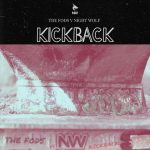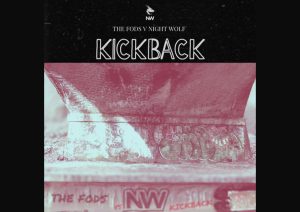The transformation from government engineer to country music sensation isn’t a path many artists take, but Leah Justine has never been one to follow conventional routes. The NW-CMA Female Vocalist of the Year has emerged as one of independent country music’s most compelling voices, and her latest single “American Kevlar” stands as a testament to her ability to channel deeply personal experiences into universally resonant art.
After a decade-long career with the Department of Defense as a licensed Professional Engineer and certified Project Management Professional, Leah Justine made the audacious decision to trade blueprints for ballads, federal service for full-time artistry. This bold career pivot reflects the very essence of the stories she tells through her music—narratives of courage, reinvention, and the relentless pursuit of one’s calling.
“American Kevlar” emerges as Leah’s most emotionally ambitious work to date, serving as a powerful tribute to military families, first responders, and the everyday heroes who operate in the shadows of public recognition. The song addresses a narrative gap in country music, giving voice to the quiet resilience of those who hold down the home front while their loved ones serve on the front lines.
The track’s lyrical architecture is built around the metaphor of Kevlar—that protective material that shields our service members—as a spiritual and emotional armor for those left behind. Leah transforms this industrial fabric into something sacred, a tangible symbol of faith and protection that sustains military families through separation and uncertainty. The genius lies in how she personalizes this protective barrier, making it both a physical reality and an emotional necessity.
Opening with the mundane specificity of “6 o’clock on a Wednesday,” the song immediately establishes an intimate domestic setting that any military family will recognize. This temporal anchor—the expected arrival that never comes—becomes a recurring motif throughout the piece, representing the disruption of normalcy that deployment creates. The transformation from routine expectation to prolonged absence captures the psychological adjustment that military families must navigate.
Leah’s vocal delivery brings nuanced emotional texture to each verse, particularly in her treatment of the line about wrapping hands around dog tags. This gesture becomes a ritual of connection, a physical bridge spanning the distance between home and service. The prayer that follows isn’t just religious devotion—it’s an act of defiance against helplessness, a way of maintaining agency in circumstances largely beyond one’s control.
The song’s second verse tackles one of the most profound disconnects in American society—the gap between civilian life and military reality. Leah captures the surreal experience of military families who exist in a state of constant awareness while surrounded by a population that can afford to remain oblivious. The lyrical observation about people who “don’t know that we’re at war” isn’t accusatory but rather melancholic, highlighting the isolation that comes with carrying knowledge others don’t share.
The juxtaposition of public composure and private vulnerability becomes a central theme. The requirement to “press on with a smile” while the world moves forward reflects the stoic facade that military families often maintain. Yet Leah refuses to let this performance mask the genuine struggle beneath. When night falls and public expectations fade, the song acknowledges the raw confrontation with reality that comes in solitude.
The bridge section introduces a devastating new dimension—the reality of military families growing during deployment. The reference to an unborn child who will take “her very first breath” without her father present transforms the song from a duet of separation into a trio of longing. This expansion of the narrative scope demonstrates Leah’s sophisticated understanding of how military service impacts entire family systems, not just romantic partnerships.
The shift from singular to plural pronouns in the final chorus—”the only thing we got protecting our heart”—represents a crucial evolution in the song’s emotional journey. What began as individual resilience becomes collective strength, acknowledging that military families form communities of shared experience and mutual support.
Leah’s production choices support the song’s thematic weight without overwhelming its intimate core. The arrangement allows her powerhouse vocals to carry the emotional narrative while providing subtle instrumental support that enhances rather than competes with the lyrical content. Her background in engineering perhaps contributes to this structural precision—every element serves a purpose, nothing is superfluous.
The repetition of the “American Kevlar” refrain functions as both musical hook and emotional anchor. Like a mantra or prayer, its recurrence provides stability amid the emotional turbulence of separation and uncertainty. Leah’s vocal treatment of this central phrase evolves throughout the song, growing from personal declaration to communal anthem.
Leah Justine’s journey from Tacoma sing-alongs to Nashville recording sessions under multi-platinum producer Kenny Royster represents the kind of authentic career progression that resonates with country music’s core values. Her stage experience alongside artists like Jimmie Allen, Love & Theft, Andy Griggs, and Alana Springsteen has clearly influenced her performance confidence and artistic maturity.
The decision to self-produce her music videos demonstrates the same independence and creative control that defines her musical approach. This hands-on involvement ensures that visual interpretations align with her artistic vision, creating a cohesive multimedia experience that extends the song’s emotional impact beyond audio alone.
“American Kevlar” arrives at a moment when country music is expanding its definitional boundaries while maintaining its commitment to authentic storytelling. Leah’s contribution to this evolution lies in her ability to address contemporary military family experiences without resorting to political rhetoric or generic patriotic clichés. Instead, she offers genuine emotional insight into the human cost of service.
The song’s power lies not in its ability to make political statements but in its capacity to foster empathy and understanding. By centering the experiences of military families, Leah creates space for civilian listeners to appreciate sacrifices that often remain invisible in daily American life.
As Leah Justine continues to build her movement of “bold dreamers who believe it’s never too late to rewrite your story,” “American Kevlar” stands as a defining statement of artistic purpose. The song demonstrates her ability to transform personal experience into universal truth, to find the extraordinary within the ordinary struggles of military life.
With upcoming releases and festival appearances on the horizon, Leah is positioned to become one of independent country music’s most distinctive voices. Her combination of technical vocal ability, authentic storytelling, and fearless career choices suggests an artist ready to make significant cultural impact.
“American Kevlar” isn’t just a song—it’s a recognition, a tribute, and a promise that the stories of military families will be told with the dignity and complexity they deserve. In Leah Justine, these families have found their voice, and country music has found its next breakthrough artist.
OFFICIAL LINKS: FACEBOOK – X – SPOTIFY – INSTAGRAM – YOUTUBE – TIKTOK











More Stories
The Fods & Night Wolf Create a New Trip Hop Vibe with “Kickback”
Jo Page – ‘When We Knew Nothing’: A Sunlit Anthem of Innocence and Reckless Joy
Big Caz Ignites Loyalty and Reckoning with “You Ain’t My Brother (Remix)” ft. Taase & Harley G